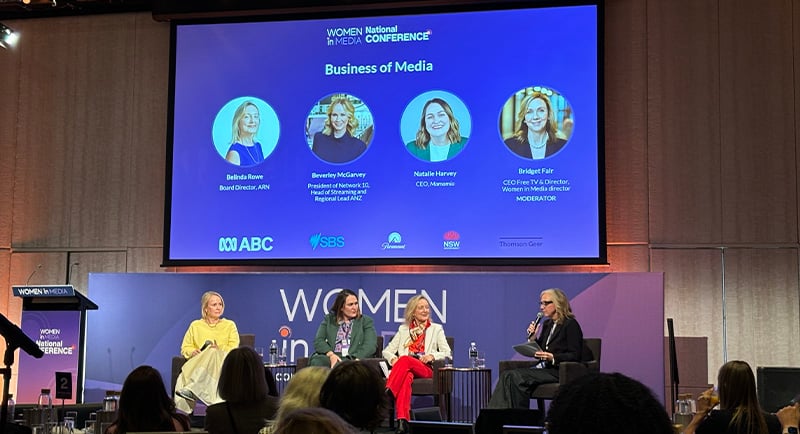According to Natalie Harvey, CEO of Mamamia, the work that the government is doing on the joint slate committee into social media “scares the shit out of me.”
Speaking at the Women in Media Conference, Harvey said that in Canada, when Meta turned news content off “they wanted to have the content and monetise it, but they didn’t want to pay for it, so the news content got replaced with political content created by general people.”
Earlier this year, a University of Canberra digital news report showed that Australians’ reliance on social media of a source as a source of news is growing, and two thirds of Gen Z report relying on social media as their main source of news. In addition, 75% of people said they’re concerned about misinformation.
“If you think about the division that’s happened in the US and in other countries around the world, that is so dangerous. If Meta takes news content off their platform and replaces it with unsafe content, what happens to that social town square is very scary because it has an impact way outside of the platforms,” Harvey added.
Speaking on the Business of Media panel, Harvey joined Beverley McGarvey, President of Network 10, head of streaming and regional lead ANZ at Paramount, and Belinda Rowe, board director at ARN, in a session moderated by Bridget Fair, CEO of Free TV and Women in Media director.
McGarvey added that newsrooms are expensive to run and maintain, pointing to New Zealand as an example of a market dealing with newsroom closures due to financial pressures.
“It’s expensive to run quality news, and you have to have it everywhere. We’re not a huge market. We’re not as big as the UK and the US, and I think having a variety of different news voices is incredibly important.
“If you can’t support journalism, then what people think is news is actually just opinion.”
For Rowe, “news is absolutely everywhere and always on, but particularly in regions there’s a huge reliance on news and information if you’re in a local community area.”
“They’ve got far less news available to them than they used to, because a lot of the publishers – newspapers, particularly – just don’t exist anymore,” she said. “We have a really valuable role to play with that regional community.”
‘You take less risk, which can mean that you get less hits’
Joking that anyone who works in content had been asked “why don’t you just commission shows that rate?”, McGarvey told the audience that her biggest tip when creating or commissioning was “don’t be cynical, try and know the audience, and always respect the audience.”
Despite this, she admitted, “there’s more financial pressure now in terms of taking a risk.”
“People used to make 50 pilots and they’d end up with two hit shows. Nobody’s making 50 pilots anymore because the economics of the business have changed,” McGarvey said.
“So I think you are under more pressure, which means that you take less risk, which can mean that you get less hits.
“It’s just about really knowing what audience you want for a particular time slot, and being really careful with your decisions.”
In the audio sphere, Rowe added that companies have access to so much data now that “we can really understand our viewers, our listeners as customers in a very sophisticated way.”
“Back in the day, when we first started, we’d create compelling content and think that the audiences would come, but now we’re actually thinking about how we attracting those audiences, how we’re retaining those audiences, how we’re doing that over time, who we need to partner with, and who we need to distribute with.”
See also: ‘Highly concerned’: Avoiding potential talent drain of women in media
–
Top image: Women in Media conference
